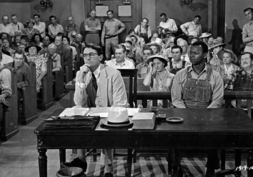By Christina Morningside | Posted on May 24, 2018 11:41 AM
To Kill a Mockingbird Will be on the Broadway Sage This Fall as Planned, Following a Settlement of the Ongoing Litigation Between the Producer Scott Rudin and the Executor of Harper Lee’s Estate.
Aaron Sorkin Adapts Harper Lee Novel for the Stage

On November 1, 2018, a new adaptation of Harper Lee’s novel To Kill a Mockingbird will begin performances at the Shubert Theatre, ahead of its opening night on December 13, 2018. The play is written by Aaron Sorkin, whose previous Broadway writing credits include A Few Good Men and The Farnsworth Invention, and who is well-known for The West Wing and The Newsroom, as well as films including A Few Good Men and Oscar winner The Social Network.
The play is to be directed by Bartlett Sher (My Fair Lady), and produced by Scott Rudin and Lincoln Center Theater. Atticus Finch will be played by Jeff Daniels (Blackbird, God of Carnage), with Scout played by Celia Keenan-Bolger (The Glass Menagerie, Peter and the Starcatcher). This carefully calibrated creative team is poised to make the stage debut of To Kill a Mockingbird a highly anticipated event of next year’s theatrical season. Until recently, the production was in peril due to a law suit filed by the executor of Harper Lee’s estate, Tonja B. Carter.
Law Suit Against Harper Lee Estate Settled

Prior to her death in 2016, Lee had granted Rudin the rights to produce a stage play of Mockingbird, as long as the true spirit of the novel was maintained. However, when Carter read a draft of the script, she felt that in particular, the character of Atticus Finch was portrayed as more apologist for the racial status quo of his time, rather than the benevolent, forward-thinking man he has come to be known as from the novel and Gregory Peck’s portrayal in the 1962 film version.
In addition, Sorkin’s script brings more the forefront the characters of Calpurnia, the family housekeeper, as well as Tom Robinson, an African-American man who is unjustly accused of rape. Rudin stated that while the stage play is true to the spirit of the novel, he refuses to mount a production whose racial politics are the same as when the novel was written, as “the world has changed since then.”
Further Complications and Countersuit
This is further complicated by the decision to release a previously unpublished work by Lee, Go Set a Watchman, which depicts Atticus Finch as an aging racist and segregationist, which is evidence that Lee grappled with Finch’s character herself.
In any case, Carter filed a law suit, accusing Rudin of producing a play that violated their agreement with Lee in terms of fidelity to the novel. At one point, Rudin event suggested presenting a production of the play inside the courtroom in order to demonstrate the fidelity of the play to the book.
Then, Rudin filed a countersuit against Carter, stating that her original lawsuit put a “cloud” over the production, thwarting his ability to raise financing. As such, he sued her for $10 million in damages due to the fact that unless her case was dropped immediately, it would be impossible for the play to move forward as planned. Fortunately, the two parties had reached a settlement. While it is unclear whether Rudin capitulated at all in terms of the script, the public statement merely declared that the case was “amicably settled.” As such, the show will go on as planned, with performances beginning this fall at the Shubert Theatre.


